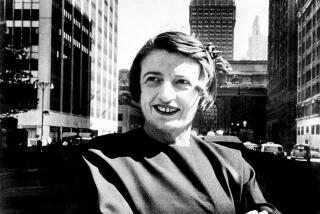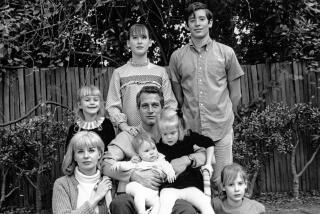CORRESPONDENCE
To the Editor:
Jonathan Kirsch seems intent on becoming a modern day Babbit of Los Angeles, eagerly selling books to people who will neither read nor pay attention to their contents. To imply that 75,000 people attending a book fair are, by virtue of attendance, the “literati” is a syllogism at best and an indulgence in ignorance at worst.
Kirsch’s belief that “writers who hand with each other are writers who are not writing” belies everything we know about some of the more prolific and talented writers of the ‘30s, ‘40s and ‘50s, including Nathanael West, Christopher Isherwood, Aldous Huxley, Henry Miller and Carey McWilliams himself, all of whom loved the company of likeminded, brilliant, often contentious fellow travelers: writers of books, publishers of books, sellers of books.
Today, according to Kirsch, we are supposed to celebrate the masses of people who flock to book fairs, such as the one conducted this year again by the Los Angeles Times, as a sign of a “literary renaissance.” People who attend these fairs do not come to talk about books or ideas but come instead to “feel” of kindredness with “real writers.” They want to see in the flesh, i.e. gaze in wonder, at the “celebrities” that we now demand our writers to become. Don’t get me wrong, there is much pleasure for the writer to be surrounded by adoring fans. But how this one-day, mutual-admiration fair contributes to writers writing more or to the creation of a “community” of writers remains a mystery to me.
I always thought a healthy dose of critical attention was what really mattered to writers writing more. There are no contemporary Carey McWilliams, Edmond Wilsons or Alfred Kazins. The remarkable Leslie Fields, who gave us the memorable phrase, “Come back to the raft again, Huck Honey,” is also gone. Mike Davis is not Carey McWilliams, and “City of Quartz” is no “Southern California: An Island on the Land.” Today, authors of novels write reviews of work by other novelists. Historians review historical books, musicians review books about music, and so it goes. Literary criticism has disappeared, especially from the pages of the L.A. Times.
Kirsch’s belief that because 2,000 people show up to listen to Joseph Heller, there is, voila, “a community of writers and readers,” is, at best, a phantasmagoria--somehow fitting, in this town of shifting images, changing landscapes and make-believe lives. At worst, it ignores the true plight of American literature today. Even Robert Kirsch, the book editor for the Los Angeles Times and a wonderful teacher, who passed away several years ago, understood the difference between fans and colleagues.
Moreover, as long lines of people check out more and more books from the public library, the quality of books available at the library and in your local bookstore has become increasingly insipid. Has Kirsch not noticed the monopolistic change in publishing in recent years? The great individual publishers, frequently relying on their own personal taste, have disappeared forever, lost in their own personal taste, have disappeared forever, lost in their own Jurassic Pork. The independent publishing houses of the not so distant past are gone forever, subsumed into giant, profit-making, non-literary corporations. We live in an age when a thing, an activity, a creation, a book, if it is of any merit, must demonstrate its worthiness by an ability to produce a line of fans, preferably in the thousands, visible to all, to prove their worth.
There is no literary renaissance in Los Angeles. There is a beautiful new library building, wonderful, new mega-stores, and a few stubborn, commercially savvy independent booksellers. Leon Fuchtwanger, Thomas Mann and Nathaneal West are dead. Long live Michael Crichton and Jonathan Kirsch.
Anna Sklar, Santa Monica
Jonathan Kirsch replies:
Anna Sklar does not disclose whether she actually attended the Festival of Books, but I came away from the 1997 outing with the renewed conviction that the community of writers and readers in Southern California is very much alive and well. Certainly Sklar is entitled to her low opinion of the quality of writing and writers, but to assert, as Sklar does, that no one among the writers now living and working in Southern California is comparable to Carey McWilliams, Edmund Wilson or Alfred Kazin is, as Sklar herself puts it, “an indulgence in ignorance.”
For example, unlike Sklar, I was deeply impressed by the sharpness of vision and freshness of insight displayed by Mike Davis in “City of Quartz”--he matches and perhaps even surpasses Carey McWilliams in the candor of his writing. Above all, I feel obliged to point out that my late father, Robert Kirsch, was a critic of eclectic taste and egalitarian ideals, who would have recoiled at the way Sklar turns him into an icon of High Culture--Bob Kirsch appreciated a great many books and authors who would surely fall short of Sklar’s distorted sense of what is important and what is not.
More to Read
Sign up for our Book Club newsletter
Get the latest news, events and more from the Los Angeles Times Book Club, and help us get L.A. reading and talking.
You may occasionally receive promotional content from the Los Angeles Times.






